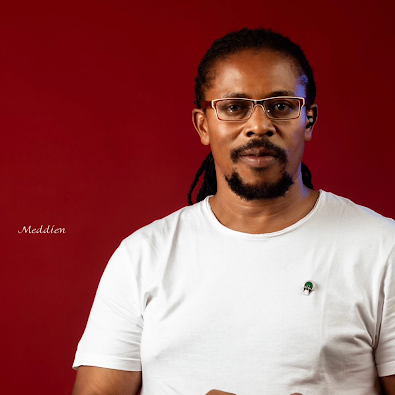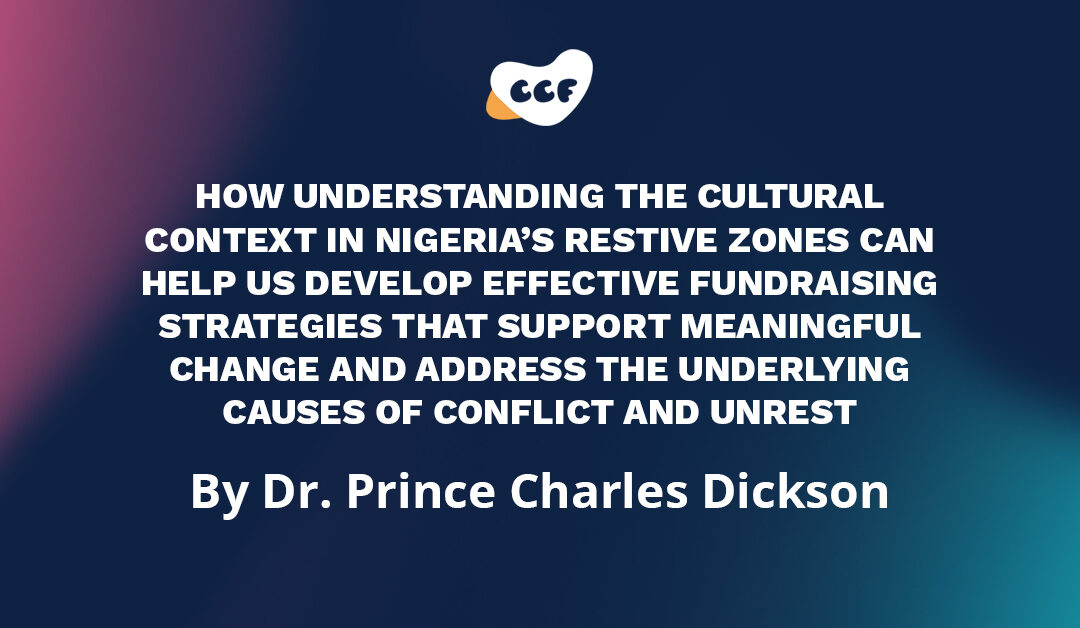By Prince Charles Dickson, Ph.D., Local Peacebuilding Expert
…it became evident to me that exploring fundraising in the African context through the lens of ethnicity, social class, and cultural dynamics offers a more nuanced understanding of how fundraising efforts are influenced and propelled within communities. These factors intersect and intertwine to shape social relationships, trust, and social capital, ultimately impacting the success and sustainability of fundraising initiatives.
Understanding the relationship between race and fundraising in the African context requires recognizing the diversity and complexities of African societies. It is important to note that Africa is a vast and heterogeneous continent with diverse ethnic, cultural, and socio-economic backgrounds. Therefore, it is not appropriate to approach the topic of race in the African context in the same way it might be understood in other regions, such as the global north.
Instead of race, a more relevant lens to explore fundraising in the African context would be through the perspectives of ethnicity, social class, and cultural dynamics. Factors such as tribal affiliations, kinship networks, and community ties play significant roles in fundraising efforts in Africa. These factors shape social relationships, trust, and social capital, which in turn influence fundraising practices and success.
In my personal experience, I have witnessed the profound impact of ethnicity, social class, and cultural dynamics on fundraising efforts within the African context. Growing up in a close-knit community, I observed how tribal affiliations and kinship networks played a crucial role in fundraising initiatives.
During a community project aimed at building a school, the fundraising process was deeply influenced by our shared ethnic background. Members of our community, bound by common traditions and customs, rallied together to contribute funds and resources. The sense of belonging and shared identity propelled our fundraising efforts as individuals felt a strong obligation to support their own ethnic group.
Furthermore, social class dynamics also played a significant role in fundraising. Those belonging to higher social classes within our community were often in positions of influence and had access to more resources. Their contributions carried weight and served as catalysts to inspire others to donate. On the other hand, individuals from lower social classes relied on their strong community ties and solidarity to contribute what they could, often through non-monetary means such as volunteering time or offering skills and expertise.
Cultural dynamics further shaped our fundraising practices. Traditional ceremonies and gatherings provided platforms for fundraising, fostering a sense of collective responsibility and shared goals. These events were not only opportunities to gather donations but also served as social occasions that reinforced community bonds and celebrated our cultural heritage.
Through these personal experiences, it became evident to me that exploring fundraising in the African context through the lens of ethnicity, social class, and cultural dynamics offers a more nuanced understanding of how fundraising efforts are influenced and propelled within communities. These factors intersect and intertwine to shape social relationships, trust, and social capital, ultimately impacting the success and sustainability of fundraising initiatives.
Understanding the specific cultural, historical, and socio-economic dynamics of each African society is necessary for a nuanced understanding
In many African societies, fundraising often takes the form of communal efforts aimed at supporting community projects or addressing shared challenges. These efforts are often grounded in the principles of Ubuntu, a philosophy emphasizing interconnectedness and communal responsibility. Fundraising activities in African communities may include collective contributions, communal labor, or organizing events to mobilize resources. The success of these efforts relies on community cohesion, shared values, and trust among individuals.
Socio-economic disparities and inequalities also impact fundraising in the African context. While race may not be the primary driver of these disparities, factors such as colonial legacies, political systems, and economic structures have shaped patterns of wealth and resource distribution. As a result, fundraising efforts may be influenced by disparities in access to resources and opportunities. Those with greater financial means or social capital may be more successful in mobilizing resources.
It is crucial to avoid generalizations when discussing fundraising and its relationship with race in the African context. Instead, understanding the specific cultural, historical, and socio-economic dynamics of each African society is necessary for a nuanced understanding. Taking into account factors such as ethnicity, social class, community ties, and socio-economic disparities provides a more accurate lens to explore the complexities of fundraising in Africa.
To succeed in fundraising in Nigeria’s restive zones, it’s essential to understand the cultural context
This personal experience … highlighted the need to foster inclusivity and diversity within organizations and to recognize the unique perspectives that individuals from different racial backgrounds bring to the table. By acknowledging and leveraging these connections, we can create a more equitable and successful fundraising environment, ultimately making a greater impact in our communities.
The considerations above are necessary to understand the Nigerian context, especially when it comes to Nigeria’s restive zones. These areas are often characterized by ethnic tensions, political instability, and economic disparities, which can create significant challenges for fundraising efforts.
In Nigeria’s restive zones, the issue of race is not always straightforward. The country is home to more than 250 ethnic groups, and these groups often have different cultural traditions, languages, and beliefs. Additionally, there are historic tensions between the North and South regions of the country, which can impact fundraising efforts.
To succeed in fundraising in Nigeria’s restive zones, it’s essential to understand the cultural context and the unique challenges each region presents. This includes building relationships with local communities and leaders, understanding the history and current political climate of the region, and developing targeted fundraising strategies that are culturally appropriate and sensitive to local needs.
In addition, it’s important to recognize that fundraising efforts in Nigeria’s restive zones may face unique challenges related to security concerns, access to resources, and the lack of infrastructure. These challenges require creative and innovative fundraising strategies that prioritize community engagement and participation.
By understanding the complex relationship between race, culture, and fundraising in Nigeria’s restive zones, organizations can develop effective fundraising strategies that support meaningful change and address the underlying causes of conflict and unrest.
How learning these lessons prompted me to adapt my fundraising approach to one that was more equitable and had greater impact for the community
Growing up in a diverse community, I was always aware of the importance of embracing different cultures and celebrating our unique identities. However, it wasn’t until I became actively involved in fundraising initiatives that I truly understood the profound impact that ethnicity can have on the success of these endeavors.
During my time as a volunteer for a local non-profit organization, we organized a fundraising event aimed at supporting underprivileged children in our community. As we began our preparations, I noticed that our team consisted of individuals from various racial backgrounds. We were a melting pot of different ethnicities, each bringing our own experiences and perspectives to the table.
As we reached out to potential donors and sponsors, I couldn’t help but notice how race played a significant role in their responses. Some individuals seemed more willing to contribute when approached by someone from their own racial background, while others were indifferent to the race of the person making the request. It became evident that there was an underlying connection between race and the level of support we received.
This realization prompted us to adapt our fundraising approach. We strategically assigned team members to engage with donors who shared their racial backgrounds, leveraging the power of relatability and cultural understanding. We also made a conscious effort to emphasize the diversity within our organization, showcasing how we were united in our mission despite our different backgrounds.
Through these adjustments, we witnessed a positive shift in our fundraising efforts. Donors from various racial backgrounds felt a stronger connection to our cause, recognizing the inclusivity and diversity within our team. Our ability to acknowledge and appreciate the relationship between race and fundraising enabled us to reach a wider audience and secure the necessary support for our initiatives.
This personal experience taught me the importance of understanding and embracing the relationship between race and fundraising. It highlighted the need to foster inclusivity and diversity within organizations and to recognize the unique perspectives that individuals from different racial backgrounds bring to the table. By acknowledging and leveraging these connections, we can create a more equitable and successful fundraising environment, ultimately making a greater impact in our communities.

Prince Charles Dickson, Ph.D.
Dr. Prince Charles Dickson is Peace Insight’s Local Peacebuilding in Nigeria. Based out of Jos, Plateau State, Dr. Prince Charles is a peace practitioner and policy analyst with decades of experience in media, public policy, psychology, and development practice. He is currently the Team Lead for the Nigerian-based Tattaaunawa Roundtable Initiative (TRICentre).
Prince Charles is a certified negotiator and arbitrator, with training in journalism and psychology. He is also a Henry Luce Fellow and Ford Foundation grantee, and holds certifications in Religion and Global Politics, Gender, Negotiation and Conflict Management and Analysis, Interfaith, Peacebuilding and Conflict Resolution.
Prince Charles is an alumnus of the University of Jos and the prestigious Humanitarian Academy at Harvard and the University of Texas at Austin. He holds a doctorate in Psychology (Policy & Human Development) from the Jesuit-run Georgetown University, Washington DC.
Discover more from CCF
Subscribe to get the latest posts sent to your email.


Wonderfully written and thoughtful, I learned a lot from reading this. Thank you!